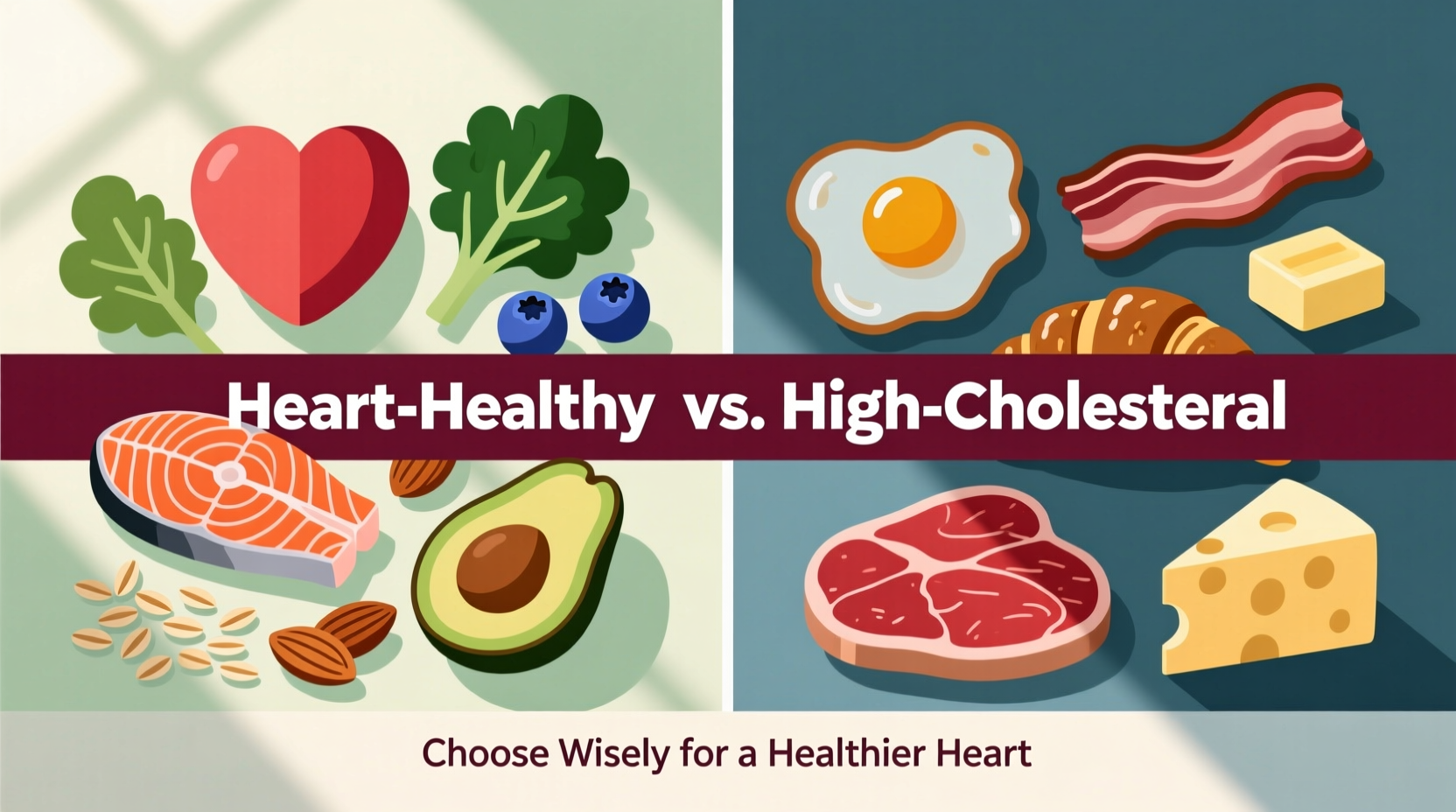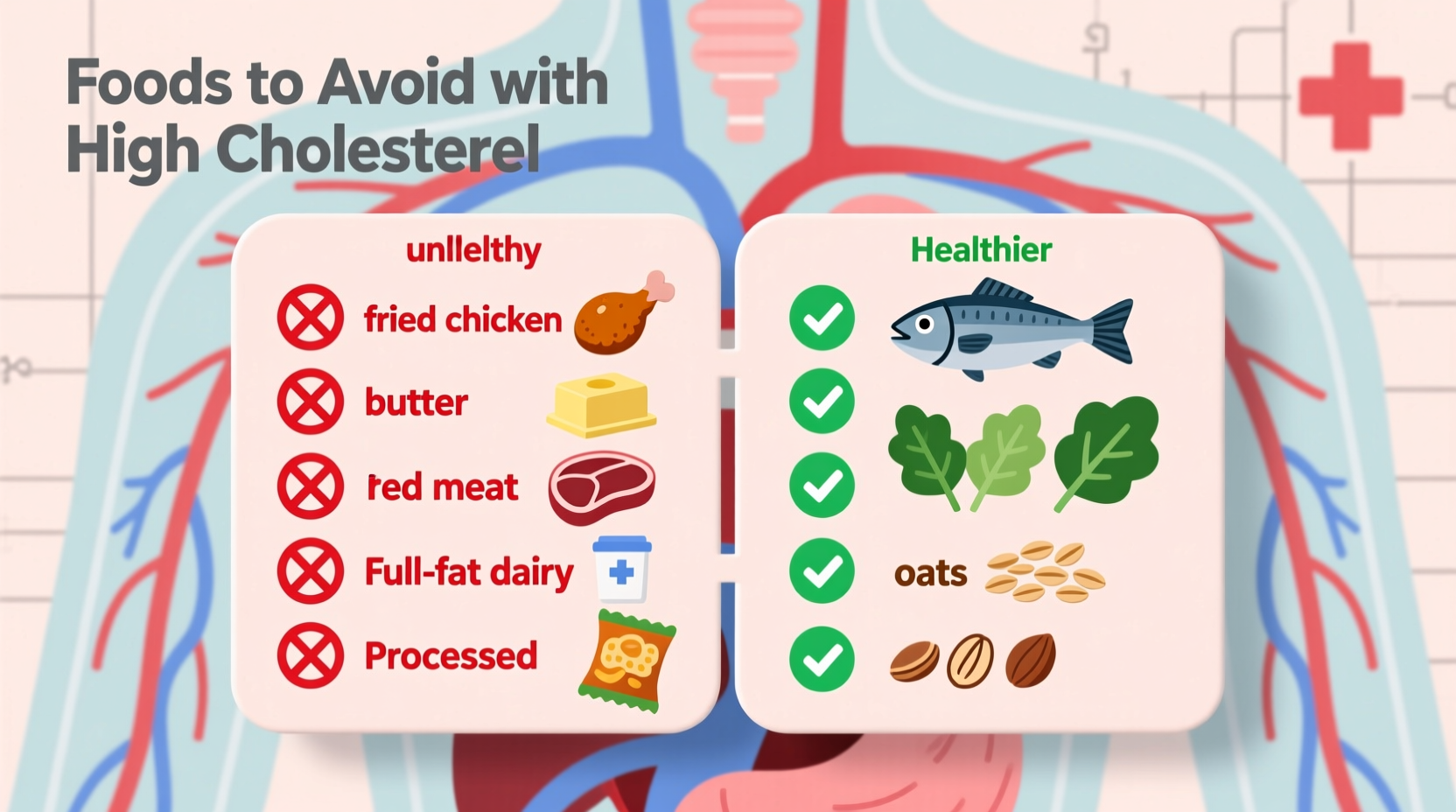Discover exactly which foods worsen high cholesterol levels and what science-backed alternatives can help improve your heart health. This guide provides clear, actionable advice based on current medical research and dietary guidelines from leading health organizations.

Your Immediate Action Plan
When diagnosed with high cholesterol, knowing precisely which foods to eliminate provides immediate direction for dietary changes. The American Heart Association recommends limiting saturated fats to 5-6% of daily calories and eliminating artificial trans fats completely. Here's what to prioritize avoiding:
| Food Category | Specific Items to Avoid | Why It's Harmful |
|---|---|---|
| Trans Fats | Fried foods, commercial baked goods, margarine, non-dairy creamers | Raise LDL ("bad") cholesterol while lowering HDL ("good") cholesterol |
| Saturated Fats | Fatty meats, full-fat dairy, coconut oil, palm oil | Directly increases LDL cholesterol levels |
| Processed Carbohydrates | Sugary cereals, white bread, pastries, sweetened beverages | Can lower HDL while raising triglycerides |
Understanding Trans Fats: The Most Dangerous Culprit
Artificial trans fats represent the single worst dietary component for cholesterol management. The FDA banned artificial trans fats in 2018, but they still appear in some products through loopholes. Check ingredient lists for "partially hydrogenated oils" - even if the label claims "0g trans fat" (products can list 0g if containing less than 0.5g per serving).
According to the Centers for Disease Control and Prevention, eliminating trans fats from your diet can reduce heart disease risk by 24%. Common hidden sources include:
- Non-dairy creamers (both liquid and powder)
- Refrigerated dough products (biscuits, cinnamon rolls)
- Premade pie crusts and pizza dough
- Coffee creamer pods
- Some microwave popcorn varieties
How Saturated Fats Impact Your Cholesterol
While not as dangerous as trans fats, saturated fats significantly raise LDL cholesterol. The American Heart Association recommends limiting saturated fats to 5-6% of daily calories (about 13g for a 2,000 calorie diet).
Foods highest in saturated fats include:
- Fatty cuts of beef, pork, and lamb (ribeye, T-bone, pork belly)
- Poultry skin (chicken and turkey)
- Full-fat dairy products (whole milk, cheese, butter)
- Tropical oils (coconut oil, palm kernel oil)
- Processed meats (sausage, bacon, salami)
Evolution of Cholesterol Understanding
Medical understanding of dietary cholesterol has evolved significantly over the past decades. This timeline shows key shifts in recommendations:
| Time Period | Prevailing Belief | Current Understanding |
|---|---|---|
| 1970s-1990s | Dietary cholesterol directly causes high blood cholesterol | For most people, saturated and trans fats have greater impact than dietary cholesterol |
| 2000s | Strict limits on egg consumption (max 3 per week) | Most healthy people can eat 1 whole egg daily without significant impact |
| 2015-Present | Focus shifted to overall dietary patterns rather than single nutrients | Mediterranean diet pattern shows strongest evidence for cholesterol improvement |
Context Matters: When Foods Aren't as Bad as They Seem
Not all high-cholesterol foods require complete elimination. Context determines actual impact:
- Eggs: While high in dietary cholesterol (186mg per large egg), most research shows minimal impact on blood cholesterol for 70% of people. The National Institutes of Health states healthy individuals can consume 1 whole egg daily.
- Shellfish: Shrimp contains cholesterol but also provides heart-healthy omega-3s. Moderate consumption (2-3 servings weekly) generally doesn't negatively impact cholesterol.
- Dark Chocolate: In moderation (1-2 squares daily), the flavonoids may actually improve cholesterol profiles despite saturated fat content.
Practical Implementation Guide
Transitioning to a heart-healthy diet requires practical strategies beyond just knowing which foods to avoid:
Reading Food Labels Like a Pro
Focus on these critical elements when evaluating packaged foods:
- Trans fat content: Check both the nutrition facts panel AND the ingredients list for "partially hydrogenated oils"
- Saturated fat percentage: Choose products with less than 5% daily value per serving
- Serving size: Verify you're not consuming multiple servings unintentionally
- Fiber content: Higher fiber foods (3g+ per serving) help manage cholesterol
Dining Out Strategies
When eating at restaurants, use these specific requests to avoid cholesterol-raising foods:
- "Please prepare my protein using olive oil or canola oil instead of butter"
- "Could you serve my vegetables steamed rather than sautéed?"
- "I'd prefer grilled instead of fried preparation for my main course"
- "Could you provide the dressing on the side for my salad?"
Smart Substitutions
Replace problematic foods with these heart-healthy alternatives:
- Butter → Avocado or olive oil spread
- Whole milk → Unsweetened almond or oat milk
- Sour cream → Plain Greek yogurt
- Creamy salad dressings → Vinaigrettes with olive oil base
- Fried chicken → Baked chicken with herbs
How Long Until You See Results?
Dietary changes typically show measurable impact on cholesterol levels within 4-12 weeks. The Mayo Clinic reports that significant dietary modifications can lower LDL cholesterol by 10-15% in just 6-8 weeks.
For optimal results, combine dietary changes with:
- Regular aerobic exercise (150 minutes weekly)
- Maintaining healthy weight
- Quitting smoking
- Managing stress through meditation or yoga
When to Consult a Professional
While dietary changes help many people, some require additional intervention. Consult your healthcare provider if:
- Your LDL remains above 130 mg/dL despite 3 months of dietary changes
- You have additional risk factors like diabetes or family history of early heart disease
- You experience side effects from cholesterol-lowering medications
A registered dietitian specializing in cardiovascular health can provide personalized meal planning that accommodates your specific preferences and cultural food traditions while optimizing cholesterol management.











 浙公网安备
33010002000092号
浙公网安备
33010002000092号 浙B2-20120091-4
浙B2-20120091-4